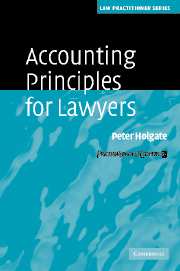Book contents
- Frontmatter
- Contents
- Acknowledgements
- Glossary of terms
- Part I The accounting environment
- Part II Some specifics
- 8 Individual entity accounts and consolidated accounts
- 9 Mergers and acquisitions
- 10 Interaction of accounting with tax
- 11 Assets
- 12 Liabilities
- 13 Leases
- 14 Pensions
- 15 Financial instruments, including capital instruments
- 16 Realised and distributable profits
- 17 Disclosures in published accounts
- 18 Use of financial information in contracts and agreements
- Appendices
- Index
13 - Leases
from Part II - Some specifics
Published online by Cambridge University Press: 28 July 2009
- Frontmatter
- Contents
- Acknowledgements
- Glossary of terms
- Part I The accounting environment
- Part II Some specifics
- 8 Individual entity accounts and consolidated accounts
- 9 Mergers and acquisitions
- 10 Interaction of accounting with tax
- 11 Assets
- 12 Liabilities
- 13 Leases
- 14 Pensions
- 15 Financial instruments, including capital instruments
- 16 Realised and distributable profits
- 17 Disclosures in published accounts
- 18 Use of financial information in contracts and agreements
- Appendices
- Index
Summary
Introduction
The current UK accounting standard dealing with this topic, SSAP 21 ‘Accounting for leases and hire purchase contracts’, was issued in 1984 and was the first UK accounting standard to require the substance, rather than the legal form, of a transaction to be reflected in the accounting treatment, predating FRS 5 by ten years. When issued, it was sufficiently controversial that Ian Hay Davison, the then Chairman of the ASC, wrote a Foreword to accompany the standard justifying its issue.
SSAP 21 deals with the accounting for operating leases, finance leases and hire purchase contracts. Prior to the issue of SSAP 21, although assets acquired under hire purchase agreements, and the associated obligation to pay, were capitalised on the hirer's balance sheet, the accounting treatment for leases was very different. Leases were simply accounted for as the payments were made, thus no asset or obligation appeared on the lessee's balance sheet.
In a nutshell, SSAP 21 sets out different accounting treatments according to whether the lease is a finance lease or an operating lease. In a finance lease, a lessee is in substance buying the asset and paying on deferred terms in the same way as it would if it took out a loan to buy the asset and was then repaying the loan.
- Type
- Chapter
- Information
- Accounting Principles for Lawyers , pp. 128 - 137Publisher: Cambridge University PressPrint publication year: 2006



